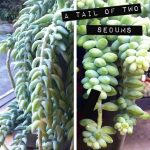It came to my attention that not all people who would like to have an awesome balcony or patio garden understand all the words commonly thrown around in the gardening world.
If you can think of a word or phrase I missed, add it in the comments!
Annual – These plants only last one season. They’re usually the plants sold as small seedlings in six packs. They often have wonderful, flashy flowers and many will drop their seed in the dirt nearby the original plant, which means that new, free plants will pop up in the spring.
Botanical Name – Refers to the Latin name of the plant in the biological classification system. It is almost always two words. The first is capitalized and is the name of the genus and the second is not capitalized and is the species. For example, Tagetes tenuifolia is the botanical name for Signet Marigolds.
Bulbs – A specialized type of perennial with a thickened underground storage organ that contains a reserve of nutrients.
Container Gardening – Growing plants in pots as opposed to in the ground.
Deciduous – A plant that loses all of its leaves in the fall and then grows new leaves in the spring.
Drought Tolerant – Plants that need very little or no artificial (i.e. provided by you) water. Keep in mind that even drought tolerant plants need regularly watering for the first few weeks after planting to help them get established.
Edible Plants – Plants you can eat. Often refers to herbs, fruits and vegetables but can also include flowers and leaves of plants that are usually used for decorative purposes.
Evergreen – A plant that does not drop its leaves in the fall.
Exotic – A plant that is not native to a particular region and could not thrive in that region without artificial (read: you) support.
Fertilizer – A “vitamin” of sorts for plants. Fertilizer comes in many forms, and adds nutrients to the soil that plants need. Typical ingredients include cow manure, bat guano, worm casings, fish emulsion, bone meal, and blood meal. Often, fertilizers are formulated for a specific plant or type of plant. Common specialized fertilizers are vegetable, flowering plant, fruit tree, rose, azalea, etc. Fertilizers usually have three numbers, something along the lines of 5-10-5. The first number is the amount of nitrogen in the fertilizer, the second is phosphorus and the third is potassium.
First Frost – The average date on which a particular area experiences their first freezing temperature in the fall or winter.
Full Shade – Plants that do best when grown in an area that is shady all day long.
Full Sun – Plants that can tolerate 6 or more hours of direct sunlight every day.
Germination – When a seed shows signs that it is sprouting, either by sending up leaves or putting out roots.
Heirloom – There is not a firm definition of an heirloom variety of plants. It always means a plant that is not a hybrid (a cross of two different plants). It often refers to plants grown for a very long time (50 or more years) and which were originally handed down through families by saving seeds from the plants each year.
Last Frost – The average date on which a particular area no longer experiences any freezing temperatures in the spring.
Native – A plant that is naturally found in a specific region. Sometimes this term can be used loosely to refer to plants that are naturally suited to the conditions found in a particular area.
Organic Gardening – Forgoing the use of any synthetic products, including pesticides and fertilizers. Often it also includes not using genetically modified plants or seeds.
Partial Shade – Plants that prefer filtered sun or that can only tolerate a few hours (less than 6 hours) of sun. Often, they are not drought tolerant.
Partial Sun – Plants that prefer 3-6 hours of sun, but can tolerate direct sun or high temperatures.
Perennial – A plant that comes back year after year. It may go dormant or die back during the winter, or it may be super hardy plant that can withstand the cold of winter. Either way, this is a plant you will have around for multiple seasons.
Potting Soil – Often not made up of dirt! A soil-like mixture specially created for the needs of container gardens and potted plants.
Seed Leaves – Many plants’ first set of leaves do not look like the leaves of a mature plant. These first set of leaves are called…seed leaves.
Transplant – The process of taking the plant from one container or place and moving it to another. It usually refers to transferring the plant from the container it came from in the nursery into a more permanent spot.
Water Deeply – Plants that need a lot of water at once instead of a little water over several waterings. Deep watering often encourages good root formation, where as frequently providing only a small amount of water encourages surface roots, when are less stable and more susceptible to drying out.

